DRIVERS have been warned of a little-known rule that will hit next week – here’s how to avoid JAIL and a £300 fine.
The hefty penalty could be the least of your worries, as breaching the policy could see your car insurance voided and a prison sentence.
Motorists have been warned not to transport fireworks in their car boots as Bonfire Night celebrations approach.
Those found with the pyrotechnics in their vehicles could lose points on their licence even if they’re not fined – or worse.
Fireworks are classified as explosives and are considered Class 1 Dangerous Goods under ADR.
This means your average motorist can carrying up to 50kg of fireworks but no more.
Ollie Green from MOT collection company Collect Service Go said: “Making sure they stay dry is essential, as damp fireworks can leak explosive materials, increasing the risk of unpredictable behaviour when ignited.”
He also urged drivers not to leave fireworks in vehicles overnight, especially in poor weather conditions.
Different classifications of fireworks have varying load limits.
UN 0336 fireworks have a small load limit of 333kg, meanwhile, transporting mixed loads of fireworks requires careful calculation to ensure compliance with the 1,000-unit threshold.
Even when transporting smaller amounts restrictions apply.
For example, you must also carry a 2kg fire extinguisher and cannot smoke.
Full ADR compliance is necessary for loads exceeding exempted quantities, including have a specially trained driver and the correct documentation.
Mr Green also explained why drivers should be careful when travelling this bonfire season.
He revealed visibility on the roads decreases dramatically by about 25 per cent – and this can last up to two days.
“When driving during and after firework displays, it’s important for drivers to reduce their speeds and use headlights when visibility is reduced, as well as their front or rear fog lights until conditions improve.” Mr Green added.
The car expert warned motorists could be fined £100 on the spot and be slapped with three penalty points if they are involved in an accident where there is poor visibility.
“In more severe cases, if the driving is deemed careless or dangerous, fines can increase significantly, and penalties can escalate to driving bans or even imprisonment,” he added.
Meanwhile, drivers are just finding out they can avoid paying a parking fine with a little-known loophole – here’s how.
Ten common driving habits that could see you fined up to £5k
By Summer Raemason
Not clearing your windscreen
Driving with a hangover
- The current drink drive limit in England, according to the government is 35 micrograms per 100 millilitres of breath, 80 milligrammes per 100 millilitres of blood, or 107 milligrammes per 100 millilitres of urine.
- The limits are lower in Scotland.
The driver sleeping in the car drunk
- Under the Road Traffic Act 1988, a motorist can be found guilty of the offence if they are “in charge of a motor vehicle on a road or other public place after consuming so much alcohol that the proportion of it in his breath, blood or urine exceeds the prescribed limit”.
Supervising a learner driver without being at least 21
- The penalty can be a fine up to £1,000 and it will also effect the learner driver who will find six points on their licence.
Placing your Sat Nav in the car so it obstructs your view
Flashing your headlights to warn other drivers of speeding
- Rule 110 of the Highway Code states: “Only flash your headlights to let other road users know that you are there.”
- And 111 adds: “Never assume that flashing headlights is a signal inviting you to proceed.
- “Use your own judgement and proceed carefully.”
Swearing or shouting at other drivers
- If you find yourself having an episode of road rage that results in you losing control of the vehicle, you can be fined £1,000.
Parking on the wrong side of the road at night
Using your phone at a Drive Thru
- This offence carries a lesser fine but still risks having to fork out £200 and six points on your licence.
- But if you’ve passed in the last two years, it could lead to a driving disqualification.
Not restraining your pets in the car
- Rule 57 of the Highway Code states: “When in a vehicle make sure dogs or other animals are suitably restrained so they cannot distract you while you are driving or injure you, or themselves if you stop quickly.
- “A seat belt harness, pet carrier, dog cage or dog guard are ways of restraining animals in cars.”


